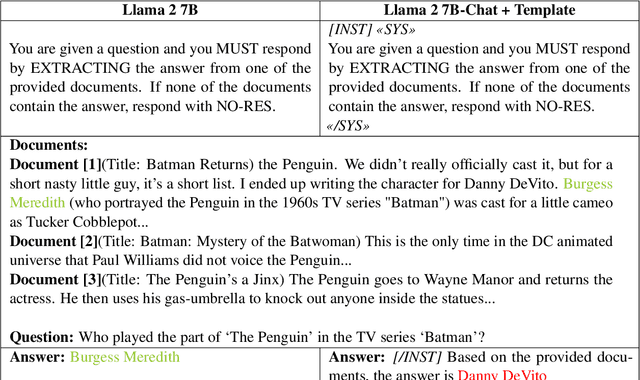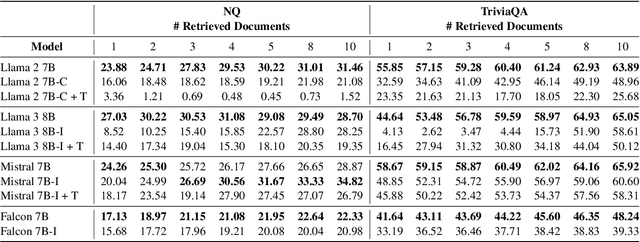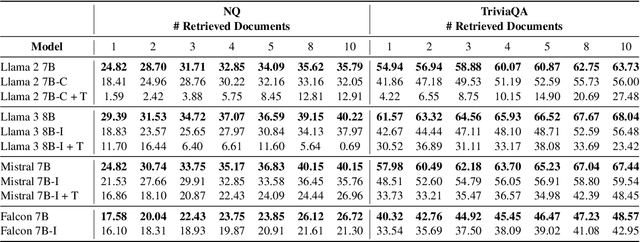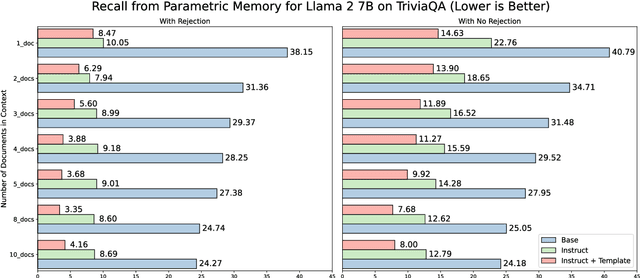Florin Cuconasu
Redefining Retrieval Evaluation in the Era of LLMs
Oct 24, 2025Abstract:Traditional Information Retrieval (IR) metrics, such as nDCG, MAP, and MRR, assume that human users sequentially examine documents with diminishing attention to lower ranks. This assumption breaks down in Retrieval Augmented Generation (RAG) systems, where search results are consumed by Large Language Models (LLMs), which, unlike humans, process all retrieved documents as a whole rather than sequentially. Additionally, traditional IR metrics do not account for related but irrelevant documents that actively degrade generation quality, rather than merely being ignored. Due to these two major misalignments, namely human vs. machine position discount and human relevance vs. machine utility, classical IR metrics do not accurately predict RAG performance. We introduce a utility-based annotation schema that quantifies both the positive contribution of relevant passages and the negative impact of distracting ones. Building on this foundation, we propose UDCG (Utility and Distraction-aware Cumulative Gain), a metric using an LLM-oriented positional discount to directly optimize the correlation with the end-to-end answer accuracy. Experiments on five datasets and six LLMs demonstrate that UDCG improves correlation by up to 36% compared to traditional metrics. Our work provides a critical step toward aligning IR evaluation with LLM consumers and enables more reliable assessment of RAG components
Do RAG Systems Suffer From Positional Bias?
May 21, 2025Abstract:Retrieval Augmented Generation enhances LLM accuracy by adding passages retrieved from an external corpus to the LLM prompt. This paper investigates how positional bias - the tendency of LLMs to weight information differently based on its position in the prompt - affects not only the LLM's capability to capitalize on relevant passages, but also its susceptibility to distracting passages. Through extensive experiments on three benchmarks, we show how state-of-the-art retrieval pipelines, while attempting to retrieve relevant passages, systematically bring highly distracting ones to the top ranks, with over 60% of queries containing at least one highly distracting passage among the top-10 retrieved passages. As a result, the impact of the LLM positional bias, which in controlled settings is often reported as very prominent by related works, is actually marginal in real scenarios since both relevant and distracting passages are, in turn, penalized. Indeed, our findings reveal that sophisticated strategies that attempt to rearrange the passages based on LLM positional preferences do not perform better than random shuffling.
The Distracting Effect: Understanding Irrelevant Passages in RAG
May 11, 2025Abstract:A well-known issue with Retrieval Augmented Generation (RAG) is that retrieved passages that are irrelevant to the query sometimes distract the answer-generating LLM, causing it to provide an incorrect response. In this paper, we shed light on this core issue and formulate the distracting effect of a passage w.r.t. a query (and an LLM). We provide a quantifiable measure of the distracting effect of a passage and demonstrate its robustness across LLMs. Our research introduces novel methods for identifying and using hard distracting passages to improve RAG systems. By fine-tuning LLMs with these carefully selected distracting passages, we achieve up to a 7.5% increase in answering accuracy compared to counterparts fine-tuned on conventional RAG datasets. Our contribution is two-fold: first, we move beyond the simple binary classification of irrelevant passages as either completely unrelated vs. distracting, and second, we develop and analyze multiple methods for finding hard distracting passages. To our knowledge, no other research has provided such a comprehensive framework for identifying and utilizing hard distracting passages.
A Tale of Trust and Accuracy: Base vs. Instruct LLMs in RAG Systems
Jun 21, 2024



Abstract:Retrieval Augmented Generation (RAG) represents a significant advancement in artificial intelligence combining a retrieval phase with a generative phase, with the latter typically being powered by large language models (LLMs). The current common practices in RAG involve using "instructed" LLMs, which are fine-tuned with supervised training to enhance their ability to follow instructions and are aligned with human preferences using state-of-the-art techniques. Contrary to popular belief, our study demonstrates that base models outperform their instructed counterparts in RAG tasks by 20% on average under our experimental settings. This finding challenges the prevailing assumptions about the superiority of instructed LLMs in RAG applications. Further investigations reveal a more nuanced situation, questioning fundamental aspects of RAG and suggesting the need for broader discussions on the topic; or, as Fromm would have it, "Seldom is a glance at the statistics enough to understand the meaning of the figures".
TEXT2TASTE: A Versatile Egocentric Vision System for Intelligent Reading Assistance Using Large Language Model
Apr 14, 2024Abstract:The ability to read, understand and find important information from written text is a critical skill in our daily lives for our independence, comfort and safety. However, a significant part of our society is affected by partial vision impairment, which leads to discomfort and dependency in daily activities. To address the limitations of this part of society, we propose an intelligent reading assistant based on smart glasses with embedded RGB cameras and a Large Language Model (LLM), whose functionality goes beyond corrective lenses. The video recorded from the egocentric perspective of a person wearing the glasses is processed to localise text information using object detection and optical character recognition methods. The LLM processes the data and allows the user to interact with the text and responds to a given query, thus extending the functionality of corrective lenses with the ability to find and summarize knowledge from the text. To evaluate our method, we create a chat-based application that allows the user to interact with the system. The evaluation is conducted in a real-world setting, such as reading menus in a restaurant, and involves four participants. The results show robust accuracy in text retrieval. The system not only provides accurate meal suggestions but also achieves high user satisfaction, highlighting the potential of smart glasses and LLMs in assisting people with special needs.
The Power of Noise: Redefining Retrieval for RAG Systems
Jan 29, 2024



Abstract:Retrieval-Augmented Generation (RAG) systems represent a significant advancement over traditional Large Language Models (LLMs). RAG systems enhance their generation ability by incorporating external data retrieved through an Information Retrieval (IR) phase, overcoming the limitations of standard LLMs, which are restricted to their pre-trained knowledge and limited context window. Most research in this area has predominantly concentrated on the generative aspect of LLMs within RAG systems. Our study fills this gap by thoroughly and critically analyzing the influence of IR components on RAG systems. This paper analyzes which characteristics a retriever should possess for an effective RAG's prompt formulation, focusing on the type of documents that should be retrieved. We evaluate various elements, such as the relevance of the documents to the prompt, their position, and the number included in the context. Our findings reveal, among other insights, that including irrelevant documents can unexpectedly enhance performance by more than 30% in accuracy, contradicting our initial assumption of diminished quality. These results underscore the need for developing specialized strategies to integrate retrieval with language generation models, thereby laying the groundwork for future research in this field.
RRAML: Reinforced Retrieval Augmented Machine Learning
Jul 27, 2023
Abstract:The emergence of large language models (LLMs) has revolutionized machine learning and related fields, showcasing remarkable abilities in comprehending, generating, and manipulating human language. However, their conventional usage through API-based text prompt submissions imposes certain limitations in terms of context constraints and external source availability. To address these challenges, we propose a novel framework called Reinforced Retrieval Augmented Machine Learning (RRAML). RRAML integrates the reasoning capabilities of LLMs with supporting information retrieved by a purpose-built retriever from a vast user-provided database. By leveraging recent advancements in reinforcement learning, our method effectively addresses several critical challenges. Firstly, it circumvents the need for accessing LLM gradients. Secondly, our method alleviates the burden of retraining LLMs for specific tasks, as it is often impractical or impossible due to restricted access to the model and the computational intensity involved. Additionally we seamlessly link the retriever's task with the reasoner, mitigating hallucinations and reducing irrelevant, and potentially damaging retrieved documents. We believe that the research agenda outlined in this paper has the potential to profoundly impact the field of AI, democratizing access to and utilization of LLMs for a wide range of entities.
 Add to Chrome
Add to Chrome Add to Firefox
Add to Firefox Add to Edge
Add to Edge